Tangibly, a trade secret management platform, has raised $1.3 million in a pre-seed financing, with participation from WS Investment Company (law firm Wilson Sonsini’s venture arm), Madrona Venture Group, and a number of seed funds, influential founders and angel investors.
Others who invested in this round are Brainstorm Ventures, Incisive Ventures, PatentVest (an IP intelligence platform), and Family Angel Management Fund, as well as individual investors Jack Newton, founder and CEO of Clio, David Rosenberg, founder of MuleSoft, and existing Tangibly investor Mark Britton, founder and former CEO of Avvo.
When Tangibly launched last February, I described it as the first IP management platform to systematically tackle trade secrets, helping companies identify and catalog trade secrets and transform them into protected assets, much as companies already do with their patents and copyrights.
“There’s technology to protect nearly every other asset class, but there is still a major gap in tech for trade secrets,” Tangibly founder and CEO Tim Londergan told me at the time. “These are assets that significantly impact enterprise value. By ensuring that every aspect of trade secrets is protected to the highest legal standard, companies of every size can now mitigate IP risk and protect their competitive edge.”
In announcing this raise, Tangibly said the new capital will be used for product development, including AI/ML initiatives,as well as building its sales and marketing teams.
Additionally, the company formally released Tangibly Share, a free non-disclosure agreement (NDA) tool designed to make it easy for companies to create, execute, track and audit NDAs.
The company’s core product, Tangibly Manage, is a cloud-based trade secret management platform that provides a dashboard where users can manage all their assets and associated people. It enables companies to ensure that their assets are well organized, articulated and protected.
“Leaking of trade secrets not only causes companies to lose their market advantage, it can also make it difficult to pursue legal enforcement action despite the very clear laws and regulations protecting trade secrets,” said Patrick Schultheis, partner at Wilson Sonsini.
“Not effectively managing trade secrets is as good as acknowledging that they have no value and as the information economy has grown, the solutions to protect these secrets has lagged substantially.”
Londergan told me in February that Tangibly has no direct competitors on par with what it is offering. A U.K. product called Hazel purports to offer trade secret asset management, but its use appears to be primarily as an adjunct to its founder’s IP consulting practice. Another, Trade Secret Examiner, appears to be primarily a database inventory system.
 Robert Ambrogi Blog
Robert Ambrogi Blog